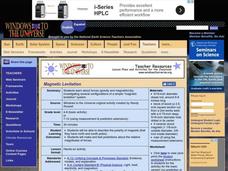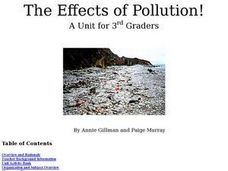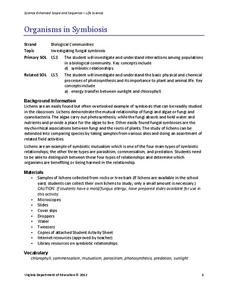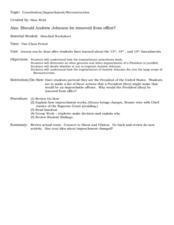Curated OER
Energy Balance in Your Life
How do young learners figure out how to balance their energy in and their energy out? The main thing to understand is calories. How many calories are in foods and beverages consumed and how many calories are burned off by physical...
Curated OER
Slime and Intermolecular Attractions
Students explore the strength of intermolecular attractions. They make slime and compare the difference in the physical properties of sheet and powdered polyvinyl alcohol with polyvinyl acetate.
Earth Day Network
Filtering Water
See the water filtration system up close with a fun science experiment. Young scientists work for several class periods to design a water filter using household objects, and then decide which filter material would be most effective...
Curated OER
DNA on Stick
Students experience a "hands-on" activity to get visual evidence of the physical nature of DNA and the process of DNA purification. They explore one method of chromosomal DNA isolation and DNA extraction.
Curated OER
# 05 Color Me Analytical
Students are introduced to colorimeter on two levels. They investigate how to physically manipulate the colorimeters. Secondly, the students start on a pathway of discovery to one of the most important principles in analytical chemistry:...
National Institute of Open Schooling
Adsorption and Catalysis
Adsorption, not absorption, is when atoms stick to the surface of an object, like water sticking to a grain of sand. An informative lesson delves into adsorption, teaching physical and chemisorption and the factors that affect them....
National Nanotechnology Infrastructure Network
Powers of Ten with the Blue Morpho Butterfly
Explore the powers of ten while examining a Blue Morpho butterfly wing. Learners discover there is a lot more than meets the eye when one looks close enough.
Curated OER
Magnetic Levitation
A thorough investigation of magnetic levitation; this activity has four parts. First, physical scientists play with a wooden dowel and three disc magnets to review polarity and repelling action. Then they experiment with...
Curated OER
Food and Energy
How many calories are needed each day? What foods have good calories? What happens to calories that don't get used? How many calories are in the different kinds of foods and drinks? How many calories do I need to do a certain activity?...
Curated OER
Mirror Exercise
Kids get up and act! To promote inventiveness, timing, and clowning, they pair up and act as though they are looking in a mirror. Child A does a move while child B attempts to mimic it as closely as possible. This is a fun activity that...
Curated OER
General Music: Grades 4 & 5
The story behind the Star Spangled Banner sets off this singing and music lesson. Emergent singers study facts about Francis Scott Key and his famous song, they then discuss and practice singing the first verse paying close attention to...
Curated OER
The Effects of Pollution!
Learners examine pollution and how it affects the environment. They discuss how human activities lead to more pollution. They talk about the importance of recycling. There is a skit, resource links, and activities provided to make this a...
Curated OER
Condensation Polymerization: Preparation of Nylon 6/6
Students participate in a lab activity in which they synthesize nylon 6/6, calculate the percent yield by mass, identify the polymer as thermoplastic or thermoset, and determine the melting point, density and end-product use of the polymer.
Exploratorium
Magnetic Shielding
Elementary magnetologists investigate magnetic shields using a variety of materials in a "shielding sandwich." While the activity isn't novel, it is engaging, and this particular resource includes a brief explanation of the phenomena...
Virginia Department of Education
Organisms in Symbiosis
Searching for an activity that allows emerging biologists to explore symbiosis up close and personal? Pupils collect samples and view lichens through a microscope and conclude with a discussion about the relationship they have...
Purdue University
Design of a Door Alarm
How does electricity work? Budding scientists explore the concepts of electrical currents and open and closed circuits with class discussion and a hands-on activity using a battery to turn on a light bulb. Learners also make predictions...
Curated OER
Constitution/Impeachment/Reconstruction
Eleventh graders analyze a chart comparing U.S. census data from 1850, 1880, 1900, and 1920. They read a handout summarizing immigration legislation from 1882-1996 and create a graph charting how open / closed U.S. immigration is over time.
Royal BC Museum
Kids Page - Whales
Read about the physical features of whales and how they are grouped according to their method of eating food. A neat activity is described on the page; consider carrying this out in class. The resource makes a nice addition to a lesson...
Exploratorium
Hot Spot
Not only does a concave mirror focus light waves, it can also concentrate infrared radiation into a hot spot. If you have a small electric heater and such a mirror, demonstrate this for your physical science class.
National Gallery of Canada
Urban Desire
Urban spaces are often overlooked and broken down. Offer your pupils the opportunity to reimagine an urban space. Learners examine and discuss works of art related to this theme and consider their own communities. Small groups then...
Curated OER
Addition Polymerization: Preparation of Polystyrene Using Two Types of Initiators
Advanced chemistry classes compare the polymerization of styrene using two different initators: benzoyl peroxide and aluminum chloride. Once they synthesize polystyrene, they compare the two producet for melting point and density. There...
University of Washington
Kepler’s Laws
Introduce your physics or astronomy class to Kepler's laws of planetary motion with this straightforward instructional activity. It covers the basic concepts of each and has learners answer questions to demonstrate their grasp on them....
Curated OER
William Tell Gallop
Students develop the skill of galloping in order to participate in more complex physical activities.
Curated OER
Sutton Jumpers
Students perfect skills learned in physical education class and use those skills to create jump routines. The troupe then performs their routines for various local and state organizations. They agree to come to practice before school,...























